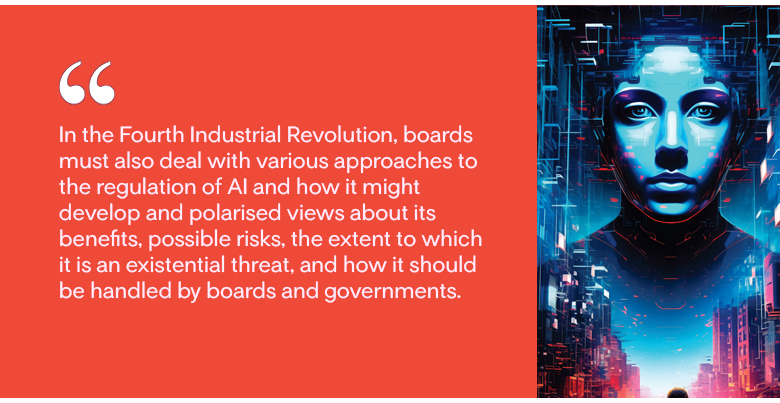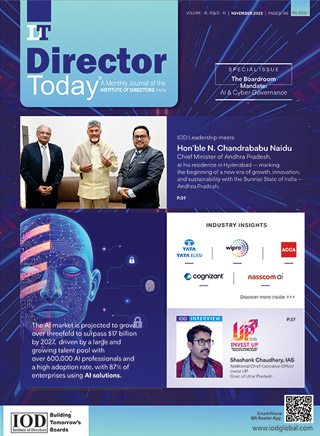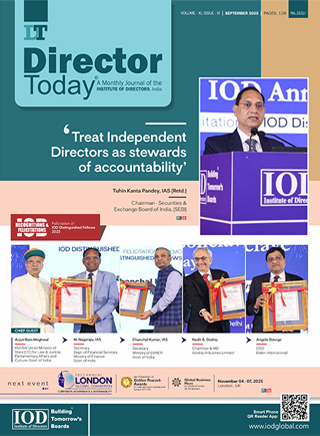Blending Intelligence and Empathy: A Boardroom Imperative for Human-Centric AI

Boards are not strangers to disruption. Cloud, mobile, cybersecurity each forced recalibration. But AI is different. Not because it's more technical but because it's more consequential.
The myth is that AI is just another technology to "understand."
It's not.
AI reshapes judgment. It embeds decisions into code. And once deployed, it scales mistakes as fast as it scales efficiency. And that's a governance problem, not a technical one.
So, the question for board directors isn't “do we have an AI strategy?”
The question is: can we govern a future where algorithms act on our behalf?
That's the job now.
Human-Centric Doesn't Mean Soft. It Means Safe.
The term “human-centric” is often dismissed as branding. In board terms, it means operational safety, reputational resilience, and regulatory foresight. When AI makes hiring, pricing, or credit decisions, empathy becomes risk mitigation. Misalignment with human values leads to lawsuits, boycotts, or black swan events that risk committee dashboards don't capture.
Empathy isn't kindness. It's insulation. The board must demand to know: Where does this AI touch the human? What can go wrong? Who owns the harm?

If no one has an answer, your liability exposure is larger than your model accuracy.
Boards Govern Culture and Culture Governs AI.
AI reflects the culture that builds and deploys it. That means board culture and blind spots echo downstream. If AI is managed like an IT upgrade, it will fail like one, but if boards install AI into the language of enterprise risk, ethics, and oversight, it aligns.
This is not theoretical. I've sat in nomination committee meetings where algorithmic tools were pitched for executive hiring with no disclosure of DEI impact. I've watched procurement teams outsource critical AI tooling to vendors with opaque models and zero explainability.
We cannot allow AI to bypass traditional board scrutiny simply because it arrives in Python, not PowerPoint.
Where Most Boards are Falling Short
1. AI Literacy Isn't Evenly Distributed. One or two directors hold the expertise. The rest defer. That's dangerous. No director should vote on AI-related decisions they don't understand. If you wouldn't do that for a spin-off or succession plan, don't do it for code at scale.
2. Risk Committees Don't Own Algorithmic Risk. Most charters don't include AI-specific oversight. That's an open flank. AI incidents, from model drift to bias, require escalation protocols like data breaches.
3. Ethical Guardrails Are Absent or Toothless. Boards may endorse AI “principles,” but rarely tie them to KPIs, audits, or executive compensation. Ethics without enforcement is just signage.
What Boards Must Do Now
1. Re-map Oversight Structures.
AI governance isn't a single committee's job, but every committee has a role:
• Audit must scrutinize AI logs and bias audits as rigorously as financial statements.
• Risk must treat AI outcomes as risk vectors, not innovation bonuses.
• Nomination & Governance must ensure leadership has AI fluency and that values are encoded into the product.
2. Install Pre-Mortems, Not Just Post-Mortems.
Before a model is deployed, ask: “If this goes wrong at scale, who suffers, and how will we know?” That single question surfaces 80% of overlooked exposure.
3. Demand 'Explainability on Demand.’
Black-box models may be operationally attractive, but they're legally brittle. Boards must require explainability for any model that affects people, money, or law.
4. Tie Human-Centric Design to Business KPIs.
If your AI system improves conversion rates but increases churn or complaint volumes, it's not working. Human-centric means outcomes, not just ethics.

Connect AI Risk to Precedent.
Boards know how to govern transformation. AI just has new mechanics. Think of Cyber risk before SEBI's cyber disclosure norms (or Sarbanes-Oxley in U.S), Data privacy before DPDP Act (or GDPR) or Climate before ESG - externalities long ignored until regulation or investor pressure demanded integration.
AI sits at the same inflection point. Boards who wait will react under pressure. Boards who prepare will lead on terms they control.
Every board meeting in 2026 will have AI somewhere on the agenda. The question is whether it shows up in your innovation deck or your incident report.
This Isn't About Trusting the Machine. It's About Trusting Ourselves.
Malicious actors don't cause most AI failures. They're caused by good people with blind spots. The board's job is to remove those blind spots by applying governance muscles to new terrain.
If a board can't explain how an AI-enabled process affects a customer, a worker, or a regulator, they're not governing it.
Final Word: This Isn't Optional.
Every board meeting in 2026 will have AI somewhere on the agenda. The question is whether it shows up in your innovation deck or your incident report. Don't mistake adoption for progress or performance for alignment. Oversight playbooks won't stretch to cover AI.
Finally, blending intelligence and empathy isn't a leadership style. It's the only viable strategy in a world where algorithms act before humans can blink. True board leadership means pairing data rigor with the courage to interrogate every model's human impact.
Author

Mr. Rohan Sharma
He is a board-facing and award-winning executive with deep crosssector experience spanning AI governance, digital transformation, and enterprise innovation, including senior roles at Apple, Disney, Nationwide, Honda, and numerous other Fortune 100 companies. He is also the CEO & Founder of ZENOLABS.AI, a member of Board of Advisor in Q4 & CMO, and an Inclusive Policy Expert in UNESCO. He is also the inventor of two U.S. patents in AI compliance and trust benchmarking. His AI Trust Index has been featured in World Economic Forum, Yahoo Finance, Fox, CBS, ABC, and 115+ media syndicates.
Owned by: Institute of Directors, India
Disclaimer: The opinions expressed in the articles/ stories are the personal opinions of the author. IOD/ Editor is not responsible for the accuracy, completeness, suitability, or validity of any information in those articles. The information, facts or opinions expressed in the articles/ speeches do not reflect the views of IOD/ Editor and IOD/ Editor does not assume any responsibility or liability for the same.

 Quick Links
Quick Links
 Connect us
Connect us




 Back to Home
Back to Home






























